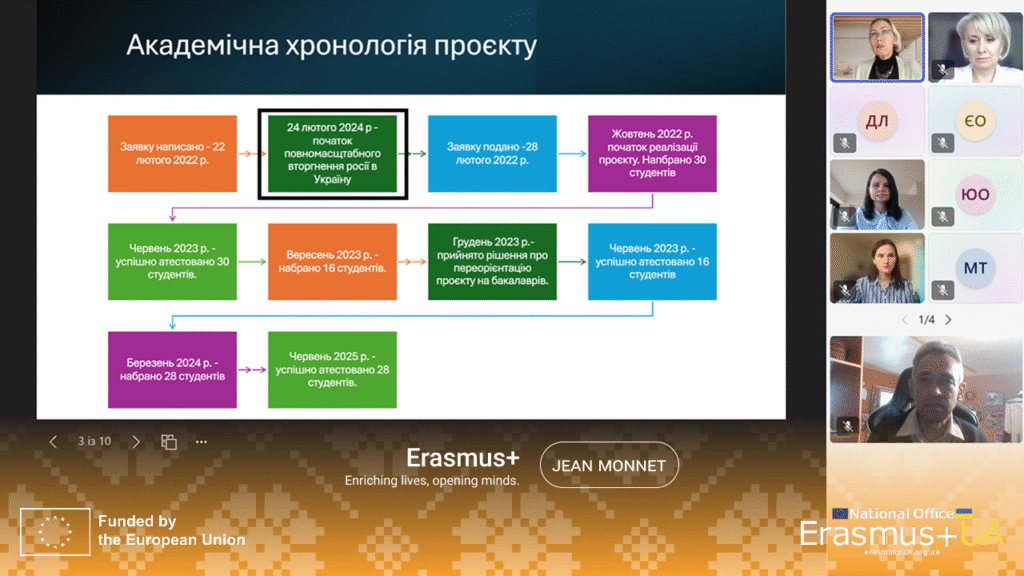Dnipro University of Technology presented the key results of the Jean Monnet project of the EU Erasmus+ Program “EU MARKET OF FINANCIAL INNOVATIONS AND UNEMPLOYMENT IN FINANCIAL SECTOR” (EUFIN) (24.09.2025, online)
On September 24, 2025, Representatives of the Dnipro University of Technology within the framework of the EU Erasmus+ Program held a final event on the completion of the Jean Monnet project “EU Market of Financial Innovations and Unemployment in Financial Sector”, at which they presented the results of the work, key developments and discussed the challenges of digital transformation of the financial market based on EU experience and EU research. The event was held within the framework of the implementation of the project of the same name.
The event was attended by more than 30 participants – representatives of the scientific and pedagogical staff and students of the university and other interested parties of the project.
During the event, representatives of the project team made presentations on the results. The speakers focused on the developed and implemented training courses, a series of round tables, discussions, online meeting with academic staff representatives from EU universities, and published scientific materials.
The event was addressed by Petro Krainik, project manager of the National Erasmus+ Office – Ukraine (EU funded project), who in his speech spoke about the need to disseminate results at the local, regional, national and international levels, continue work to ensure the sustainability of results, mutual exchange of experience, the importance of ensuring the quality of project completion and reporting, communication with the EACEA project officer, and also highlighted the opportunities for participation in new Call for proposals of the EU Erasmus+ Program including Jean Monnet.
Additionally:
PROJECT NAME: EU MARKET OF FINANCIAL INNOVATIONS AND UNEMPLOYMENT IN FINANCIAL SECTOR /EUFIN/
PROJECT SUMMАRY
The financial sector changes under the influence of technology process and it is really hard for specialists to be relevant and demanded on the labour market. According to “Digital Finance Strategy for the EU” (Brussels, 24/9/2020 COM (2020) 591 Final) the future of finance is digital. The fourth priority of the “Digital Finance Strategy for the EU” underlines that it is crucial issue to address new challenges and risks associated with the digital transformation including protecting consumers, the public interests, improving financial literacy by focusing on digital transformation and increase the accessibility of the financial services for the consumers. The development of financial innovations step by step replaces human work and as a result we have many unemployed. “Old fashion” banking and financial services are still on demand but huge share of private customers is moving to on-line services and financial apps getting high level of mobility and services. The main objective of the project to prepare highly qualified staff for financial sector and economy which will be ready to face with challenges of digital transformation in the financial market on the basis of EU experience and EU studies.
The concept of the project is based on the mix of the “methodological triangle” and EU practice in financial market from the one hand and teaching excellence on the other hand. This project will help to increase the understanding of Euro studies and peculiarities of the modern EU financial market by our students. It will lead students step by step through the foundations and peculiarities of financial innovations, allow them assessing risks and benefits from financial innovations, developing their analytical and soft skills, using critical and design thinking involving in their researches EU statistical databases and reports.
Funded by the European Union. Views and opinions expressed are however those of the author(s) only and do not necessarily reflect those of the European Union or the European Education and Culture Executive Agency (EACEA). Neither the European Union nor EACEA can be held responsible for them.

